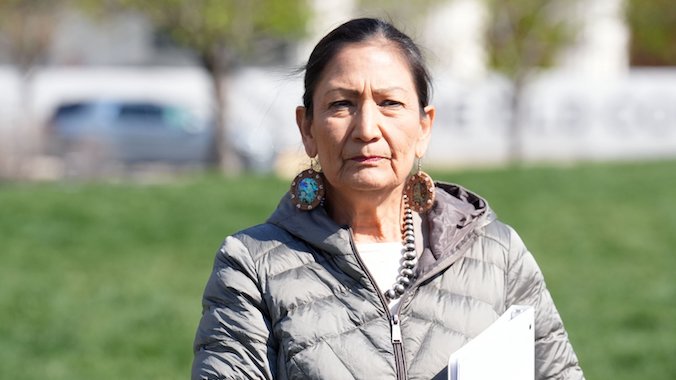Biden Administration to Extract $1.5 Billion From Oil and Gas Drillers
Photo by Bill Greenblatt/UPI/Shutterstock
The Department of the Interior is raising rates the fossil fuel companies must pay to drill for oil and gas on public lands for the first time in more than a century. The move, announced on the same day the Biden administration unveiled another $7.4 billion in student loan debt forgiveness, adds another dance step to the often frustrating tango the “climate president” is engaged in.
“These are the most significant reforms to the federal oil and gas leasing program in decades,” Interior Secretary Deb Haaland said in a statement. The primary reform is actually one mandated by Congress in the 2022 Inflation Reduction Act: it raises the royalty rate for drilling on public land from 12.5 percent up to 16.67 percent. That 12.5 percent rate was set in 1920.
The minimum bid that companies can submit for leases on public land is also going up, from $2 per acre to $10 per acre. And one additional move is straight from the White House rather than Congress: the minimum lease bond for drilling on public land is rising from $10,000 — set in 1960 — to $150,000. If companies have multiple leases in a single state, the minimum jumps from $25,000 to $500,000.
In total, the moves are expected to bring in $1.5 billion from fossil fuel companies between now and 2032, which will be divvied up between the states, water projects out west, and the Treasury and Interior departments. While it may limit the reach of some smaller companies, there is little chance this actually discourages much drilling from the big boys of oil. (Though predictably, industry groups are still throwing cute little fits about it.)
Still, it has to be seen as a positive to inflict a little bit more pain on an industry that continues to enjoy massive financial incentives to drill up dirty stuff — around $14 billion per year and climbing, according to an OECD subsidy tracker. A win is a win — except that the win came only days after a huge step backward: the administration issued a final construction permit for the massive Sea Port Oil Terminal, a deepwater station off the Texas coast that will be capable of loading two million barrels of oil per day onto tankers for export.
The White House repeatedly has claimed that moves like Sea Port, or the Willow oil drilling project in Alaska, are essentially required by law. But Biden has also proven to be something of an incrementalist when he wants to be, picking away at bits of student loan debt where possible or where legal challenges are unlikely to succeed. The increased drilling royalty and bond rates while glumly issuing the huge project approvals could be seen as a version of that approach, but climate change doesn’t work that way. The offshore oil facility will only start sending out those millions of barrels in 2027, and will likely exist for half a century; those are years and tons of greenhouse gases we don’t get back.